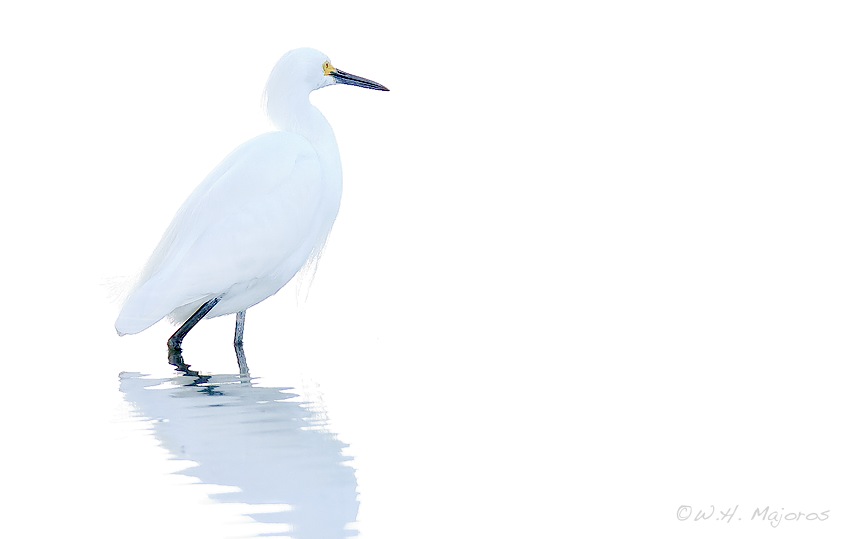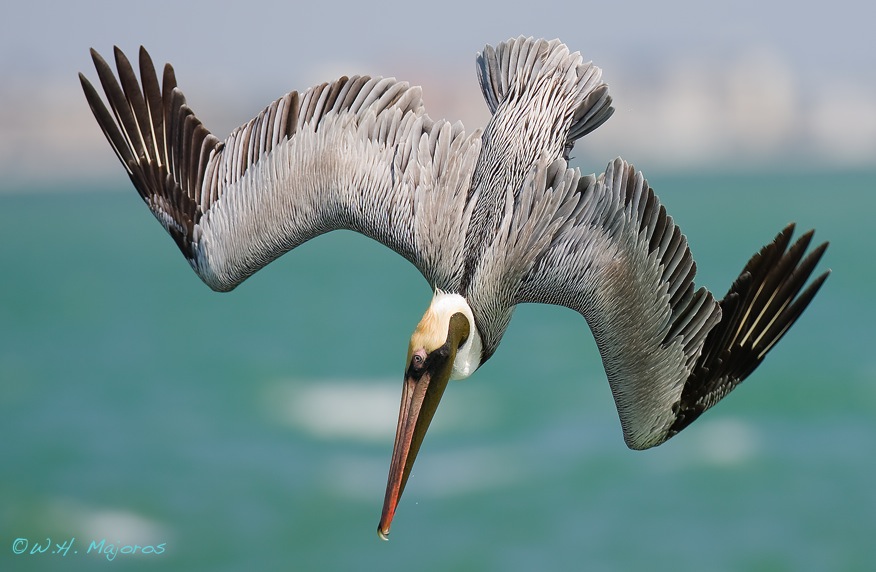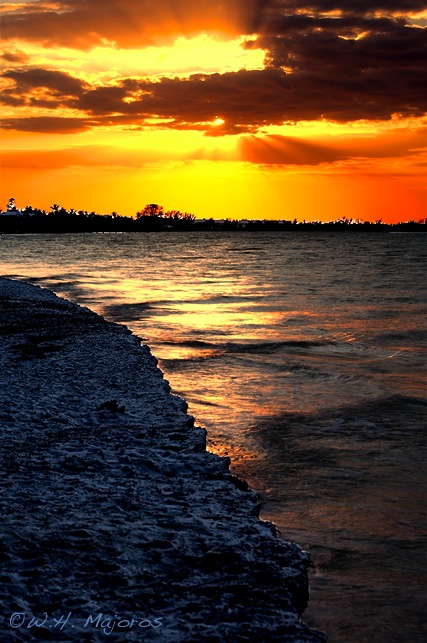March
5
Thursday
4495
photos
|
This
morning I decided to go to Little Estero Lagoon again, since I was
fairly pleased with a number of the "keepers" I got there
yesterday. Unfortunately, there were very, very few birds there
today. The tidepool next to the north pier was completely devoid
of
birds, so I had to walk down further away from the lagoon to the rather
larger pools to the south, where I found a handful of birds.
With so few birds present, getting any interesting interactions between
birds seemed unlikely, so I contented myself with static portrait
shots. Since I shoot almost exclusively in manual exposure mode
now, my first shot of the day is always a white object (when I can find
one) that I can use to get an initial exposure reading. It
usually takes a few shots for me to adjust my exposure so as to be
shooting as
bright as possible without activating the highlight alerts. Today
I took my test shots using a back-lit snowy egret with lots of bright
light reflecting in the water around the bird. Although I usually
delete these test shots after calibrating my exposure, I decided to
keep this one since it reminded me of the "polar bear in a snowstorm"
jokes from gradeschool:

Snowy Egret in
Blinding Sunlight.
600mm at f/8. 1/320 sec at ISO 1250.
Fill flash at +1.
The
snowy provided just about the only entertainment during my visit to
Estero today. I did notice that I was able to get some more
colorful backgrounds by shooting toward the inland side of the
tidepool,
where there is some grass growing in front of the hotels:
Snowy Egret at
Little Estero Lagoon.
600mm at f/6.3. 1/1250 sec at ISO 125. No flash.
With the tall, white resort buildings in the background, the water took
on a bit of a silvery hue when shot at the right angle, which I liked:
Snowy Egret at
Little Estero Lagoon.
600mm at f/6.3. 1/1250 sec at ISO 125.
Fill flash at +1.
Besides the snowy egret, there was a
small group of pelicans present, but they sat in front of the sun and
preened, so there was little I could do, photographically, with
them. A tri-colored heron eventually wandered over to my side of
the pond, and I again found the background colors and the texture and
color of the water to my liking:
Tri-colored Heron
at
Little Estero Lagoon.
600mm at f/5.6. 1/1250 sec at ISO 125. No flash.
And then something very surprising
happened: a bird flew in which I had never seen before. Soon it
was foraging close to my position. When I realized that this was
a Reddish Egret, I was
ecstatic:
Reddish Egret at
Little Estero Lagoon.
600mm at f/9. 1/250 sec at ISO 125.
Fill flash at +1.
Unfortunately, after taking about three photos of the bird, it flew
off, along with the few other herons and egrets. I waited a short
while for them to return, then decided to just leave and try a new
site.
I decided it was finally time to pay a visit to the legendary Sanibel
Island. All the reports I had been getting from other
photographers during my trip indicated that a trip to Sanibel would be
a waste of time. I decided to try it anyway, since Little Estero
was dead and I didn’t feel like going back to Corkscrew or
Tigertail.
The traffic on the way to Sanibel is reputed to be downright
awful. I arrived in town around 10:30am and found it to be very,
very slow, but still bearable. From the time I crossed the bridge
to the island to the time that I arrived at the Ding Darling refuge on
Sanibel, perhaps 45 minutes had elapsed. Ding Darling was mostly
dead too, except for one of the ponds early on the wildlife loop, where
a fairly large number of birds were napping some distance from the
road. Because the birds were a bit too far away (precluding
significant feather detail), were at a lower elevation than the road
(precluding eye-level shots), and because I wasn’t happy with the angle
of the sunlight nor the lack of activity among the birds, I didn’t even
bother getting out the camera. And
those were just about the only birds I saw in Ding Darling.
Around noon I decided to try the Fisherman’s Pier at the eastern end of
Sanibel, by the lighthouse. I was in luck: there were some
egrets and terns flying around at close range at the pier, and a large
flock of brown pelicans diving close to shore:

Pelican diving
off Sanibel Island.
600mm at f/5. 1/1000 sec at ISO 160.
I’ve always enjoyed watching pelicans dive for fish. If you’ve
never seen this for yourself, you’re really missing something
cool. As they approach the surface of the water, they draw in the
wings, and sometimes angle a bit to fine-tune their trajectory toward a
school of fish:
Pelican Diving
off Sanibel Island.
600mm at f/5. 1/1600 sec at ISO 160.
When their beak penetrates the water
they throw the legs and wings straight back so that the whole animal
becomes arrow-shaped, in preparation for the plunge:
Pelican diving
off Sanibel Island.
600mm at f/5. 1/1250 sec at ISO 160.
Virtually the entire bird submerges, with just the tips of the wings
protruding from the surface:
Pelican Wingtips.
600mm at f/5. 1/1250 sec at ISO/160.
After filling a few memory cards with pelican-diving photos, I turned
my attention to the pier. The word is that there are usually some
egrets that hang out on the pier to collect discarded fish scraps,
though at least one photographer (at Shark Valley, a few days ago)
informed me that he waited all
afternoon for them to show up, to no avail. I was a bit
luckier. Shooting the birds on the pier proved tricky with all
the people around, but occasionally they did perch in the trees at the
top of the beach, and then I was able to get some natural-looking
portraits, somewhat reminiscent of the Wild Bird Center on Key Largo:
Snow Egret at
Fishermen’s Pier on Sanibel.
600mm at f/10. 1/250 at ISO 100.
Fill flash at full power (+3).
Notice the sandy feet on the bird above —
they do forage along the
beach itself, though I didn’t have much luck with the backgrounds when
I tried for those shots.
As I mentioned, it’s hard to get good egret shots on the pier, because
there usually end up being people in frame:
Great Egret on
Fishermen’s Pier, Sanibel Island.
200mm at f/10. 1/500 sec at ISO 160.
Fill flash on high-speed sync at full power (+3), no beamer.
Terns also hang out near the pier,
and will come down to try to claim fish scraps left by the fishermen:
Tern at
Fishermen’s Pier, Sanibel Island.
200mm at f/5.6. 1/640 sec at ISO 250.
Flash on high-speed sync at full power (+3).
Following the advice of Arthur
Morris, I brought along a cooler full of freshly thawed sardines.
Unfortunately, a large sign at the entrance states that city law
prohibits feeding of wild birds. I decided to use my $12 box of
sardines as bait —
i.e., setting out a fish or two just to draw in
the birds, without actually letting them have the fish. That way
I wouldn’t be breaking the law. Unfortunately, the gulls proved
to be very quick at snatching up anything not nailed down to the pier:
Gull and Sardine.
160mm at f/5.6. 1/800 sec at ISO 800. No flash.
After losing several fish to the
gulls, I gave up on the baiting strategy, for fear that my actions
would be misinterpreted as intentional feeding of the birds. By
that time, however, one of the egrets had observed me taking fish from
my cooler, and apparently learned that the cooler was the source of the
food I had been setting out. Here you can see the bird cautiously
approaching my fish cooler:
Snowy Egret
Contemplates the Fish Box.
70mm at f/8. 1/400 sec at ISO 160.
Fill flash on high speed sync at -2/3.
I think the pier has great potential for getting action shots of the
snowy egrets, if you’re patient. The snowies do occasionally
fight in mid-air, and with a short zoom lens, if you position yourself
well and have lots of patience, you should be able to get some great
flight shots. I didn’t quite have the patience for it that day,
but this image (below) shows you how close you can expect to get to the
birds
for the action shots (and again I have to say that I personally like
the "polar bear in a snowstorm" look, though I know that not everyone
does):
Snowy Egrets at
Fishermen’s Pier, Sanibel Island.
195mm at f/5.6. 1/640 sec at ISO 250.
Fill flash on high-speed sync at full power (+3).
There were five or six snowies there
that day, plus a great egret and a great blue heron. There’s also
a very accessible osprey nest right there at the lighthouse, but
ospreys were low on my list of priorities at that point, since I had
many osprey photos already.
I should note that parking at the pier is very expensive —
$2/hour —
and the signs threaten severe penalties for failing to pay
(including imprisonment and/or extraction of internal
organs). I ended
up staying late because I wanted to catch the sunset. That turned
out to be a good idea, and made the exorbitant parking penalty worth
paying, in my
opinion. Here’s a silhouette of a great blue heron in the
shallows next to the pier:
Great Blue Heron
on Sanibel Island.
200mm at f/11. 1/1600 sec at ISO 320. No flash.
To the west of the pier is a little cove where pelicans sometimes
congregate, and when they fly back toward the pier in the evening they
sometimes pass in front of the sunset:
Brown Pelican at
Sunset.
600mm at f/11. 1/500 sec at ISO 320.
The terns also foraged in that cove at sunset and gave
me some silhouette opportunities too:
Tern at Sunset.
600mm at f/14. 1/500 sec at ISO 320.
Below is a wider shot of the sun setting behind the
cove:
 Sunset
at the Fishermen’s Pier, Sanibel Island.
Sunset
at the Fishermen’s Pier, Sanibel Island.
HDR image composed from five exposures.
Canon 30D and Tokina 12-24mm lens at 12mm.
Overall,
I was pretty satisfied with Sanibel, though I now wish I’d tried Ding
Darling in the morning or evening. Today I took more photos than
at any other time during my trip. The excitement wasn’t limited
to my Sanibel visit, however. As I was arriving back at my hotel
in Naples, five or six police cars burst into the parking lot with
sirens blazing,
stormed into the hotel’s lobby, and hauled out some guy who looked
beaten up and bloodied. They strapped him into a stretcher and
carted him away in an ambulence. Wow.
|